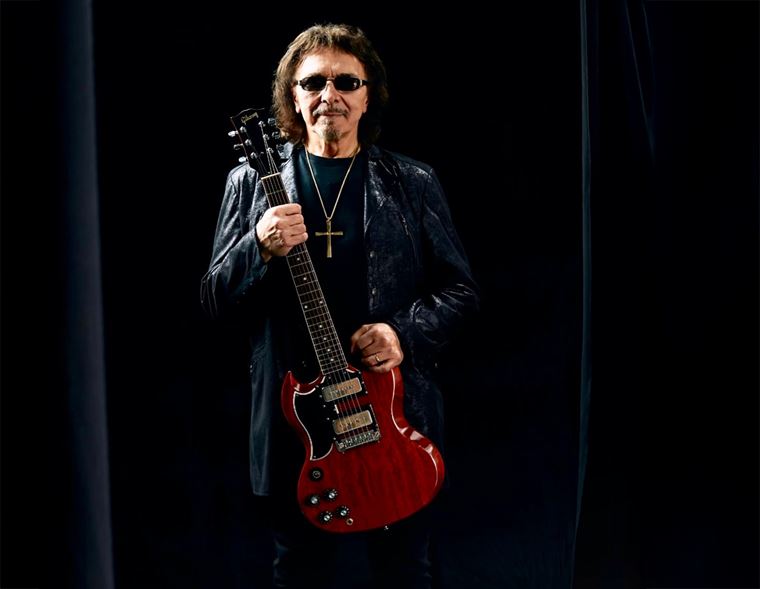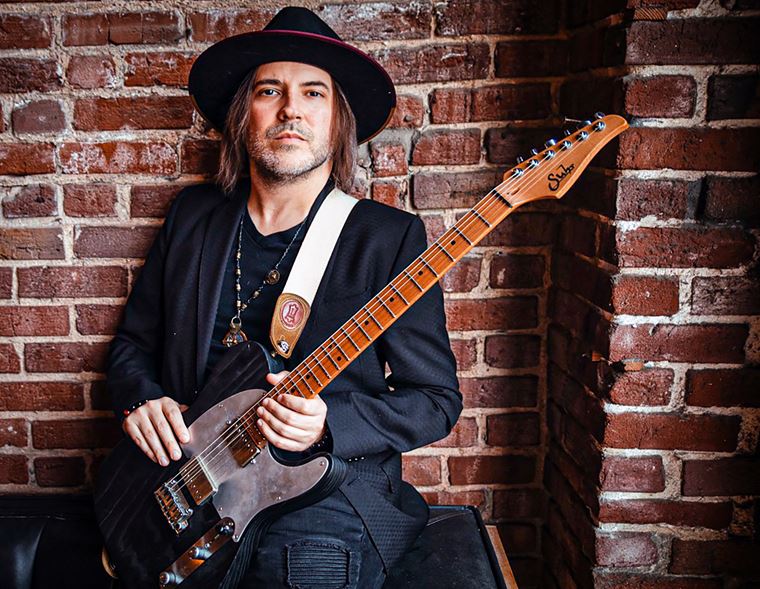The Greatest Bass Riffs Ever!
A great bass riff is worth its weight in gold.
All too often, the bassist is expected to follow the lead of the guitarist, sticking to root notes or doubling up on the guitar riffs. This is all fine, but we love it when the bass takes charge!
With that in mind, we gathered together a longlist of outstanding bass riff moments and whittled it down to 15 examples of prime riffness!
In no particular order, here are our Greatest Ever Bass Riffs...
Peaches – The Stranglers
Now this is how you begin a song! JJ Burnell’s P-Bass growls with attitude as it spits out this sleazy, snarly bassline. The organ picks up the turnaround before the drums and guitar enter and break into a slippery groove. It’s a cheeky song, but it’s a lot of fun and contains some preposterous lyrics that we’ll let you google.
The tune has been used in adverts, films and TV shows, making it one of those tunes that you know, even if you don’t!
Under Pressure – Queen and David Bowie
This bassline says so much with only two notes. As a song, Under Pressure is a career-best for both parties. It also pulls off the task of sounding like a Queen song AND a David Bowie song equally, even though the two acts normally sound miles apart! True collaboration indeed.
The bassline is the identity of the song: the notes even remain the same when the chords change during the verse’s descending patterns.
Come Together – The Beatles
McCartney’s best bassline? Maybe so. As with most things in popular music, the Beatles made a good stab (to say the least) at having an ear-catching opening bass riff.
Weirdly, Come Together started out as a song John Lennon wrote as a theme tune to Timothy Leary’s campaign for governorship of California.
It’s one of the Beatles’ most covered songs, with versions from artists such as Aerosmith, Michael Jackson and even Marilyn Manson.
Ted, Just Admit It – Jane’s Addiction
Los Angeles art-rockers Jane’s Addiction have more than their fair share of exceptional basslines. ‘Deep groove’ is a concept that bassist Eric Avery espoused on numerous occasions, and this has never been more prevalent than on Ted, Just Admit It, an epic, sprawling cut from 1988’s Nothing’s Shocking about the trial of notorious serial killer Ted Bundy.
The other prominent bassist associated with Jane’s Addiction is none other than Flea, a man we’ll be hearing more on later.
Rock fans who think that 80s Sunset Strip Rock was all about Motley Crüe and Guns ‘n’ Roses need to dig a little deeper for the real gold. Perry Farrell’s famously high growl, Avery’s Deep Groove, Stephen Perkins’ mountain-cavern drums and Dave Navarro’s ridiculously confident guitar playing add up to make this song an alternative epic.
Money – Pink Floyd
The Floyd are so good at articulating complex ideas in simple ways that it isn’t immediately clear that this bassline is in the time signature of 7/4! Prog-tastic for sure but Roger Water’s bass part is so musical and melodic that it doesn’t feel self-consciously ‘technique-ey’ at all.
Whilst it may be fair to say that in Pink Floyd, Waters had the lyrics and vision whilst Gilmour had the musical chops, we’d say that Waters is somewhat underrated as a bassist. Lyrically, the song is surprisingly direct: according to Waters, it is not a wry commentary on the evils of money but, rather, the opposite:
"I remember thinking, 'Well, this is it and I have to decide whether I'm really a socialist or not.' I'm still keen on a general welfare society, but I became a capitalist. You have to accept it. I remember coveting a Bentley like crazy. The only way to get something like that was through rock or the football pools. I very much wanted all that material stuff."
Surprising, perhaps, yet typically forthright.
Thank You (Falettinme Be Mice Elf Agin)- Sly and the Family Stone
In the future, Sly Stone will be spoken of as a major musical innovator, influence and force for good during troubled times. As mastermind of the mixed-race, mixed-gender Family Stone (including several actual family members), Sly put out some of the most infectiously funky grooves in existence, filled with attitude, panache and style. That he did so in the face of sometimes extreme adversity only makes his star shine that much brighter.
The Family Stone’s bassist, Larry Graham, also casually invented the slap bass technique with this song. Simple, direct, deep and soulful, Graham’s unique style brought bass playing several steps into the future. Mark King, Flea, Bootsy Collins and all other slap-frenzied bassists owe Graham a huge debt.
Schism – Tool
As anticipation hits fever pitch for their new album (it has only been a 14 year wait so far...), now is an appropriate time to talk about something everybody already knows: Tool’s Justin Chancellor is one of the most creative bassists currently making music.
In Tool, the bass, and most often the drums, take on ‘lead’ roles, swapping the usual instrumental stereotypes to give the band at large a very singular sound. To say that this sound has proven influential is quite the understatement: there are whole genres of band now (modern Prog Metal, basically) who all sound, to a greater or lesser extent, like these LA-based musical mystics. For many years now, saying that you are a Tool fan marks you out as a particular type of music lover: the insinuation being that you are a cut above a ‘mere’ metal fan if you like Tool! Are they taking things too seriously?
It’s not hard to understand why Tool fans feel this way, though, given the band’s spectacular (if slight) output. Complex counter rhythms, multiple time signatures (they wrote a tune to correlate with the Fibonacci sequence, for goodness sake! And then pretended it was a casual joke!) and a strong visual aesthetic are just some of the reasons why so many people resonate with Tool’s metaphysical Prog Metal.
Schism is as good an example as any, particularly as it shows off Chancellor’s exemplary composition and arranging skills, not to mention some tasty use of effects, too! His bassline is fluid, melodic and leads the song. It is the frame around which the rest of the instruments hang, and it does this brilliantly.
Love Will Tear Us Apart – Joy Division
Peter Hook is a national treasure, there’s no mistaking that. The antics of Factory Records, New Order and the Hacienda nightclub sometimes threaten to overshadow Hook’s sheer musical ability. His bass parts are inventive, melodic (at a time when basslines were anything but) and instantly distinctive. You can hear his sound a mile away!
Joy Division’s most famous song may seem like a lazy choice on our part, but things change one you realise that the song’s main melody was written on the bass first and then carried over to Ian Curtis’ lead vocal.
There has been plenty written already about the sad end of Joy Division. Instead, let us celebrate a band that sounded like no other, who influenced countless others, and who brought us a body of work that will seemingly never fall out of relevance.
Around the World – Red Hot Chili Peppers
Now this is how to start an album! It was always a dead cert that Flea would show up on here, but when the answer to the question ‘what’s his greatest bass riff’ is answered by ‘all of them’, it’s a toughie to select just one.
Flea is often the dominant musical voice in the Chilis, but this tune, off 1999’s gajillion-selling Californication, takes that dominance to the nth level! Using a simple Boss overdrive pedal, Flea’s bass atomises your speakers as it punches out its furious flurries of notes. It’s thrilling, basically.
When the riff returns half-way through the song, pay attention to drummer Chad Smith’s deft beat-swap into half-time and realise the true mightiness of dropping a groove. Genius.
The Chain – Fleetwood Mac
Your uncle will keep telling you that THIS is the bassline from Formula one on the telly. It’ll happen every time he hears it, so just accept it.
Taking your mad uncle out of the equation, you’re left with two great songs squished together. The iconic bassline, of course, is from the second part. We aren’t really sure why they didn’t just make an entirely separate song out of this awesome instrumental part, but we’re guessing Fleetwood Mac aren’t losing too much sleep over our judgement.
Hysteria - Muse
Sci-fi Rock trio Muse are deservedly known as highly talented musicians. Frontman Matt Bellamy and drummer Dominic Howard do tend to get most of the plaudits, understandably, given their virtuosic command over their instruments!
Muse bassist Chris Wolstenholme has his moments too, though. One of his mightiest basslines comes at the beginning of Hysteria, from their 2003 album Absolution. This powerhouse tune begins with a note-heavy, furious piledriver of a bassline. The sound itself is in fact two basslines: a distorted bass guitar on one side (he likes an EHX Big Muff) and an analogue synth at the other side to further accentuate the part’s quasi-electro science fiction vibe. Muse have actually done this kind of doubling up before, on songs like Citizen Erased from their Origin of Symmetry album. It’s very effective!
Hysteria’s bassline is often voted online as the greatest bassline ever. Wrestlers like Nicole Matthews use Hysteria as their intro music. It’s also in video games like Rocksmith and Rock Band, sealing Hysteria’s deal as one of the defining basslines of modern Rock.
Good Times – Chic
This irrepressibly upbeat disco anthem has an absolute killer of a bassline! Released in 1979, this ode to having fun has been massively sampled, not least by the Sugar Hill Gang, who’s tune Rapper’s Delight made full use of Bernard Edwards’ bassline. No wonder! It’s a cracker, being simultaneously busy, distinctive and full of groove, all whilst still being ‘hummable’.
It’s one thing to play a complicated bassline, but it’s another thing to write one that almost everybody in the world knows and loves. Good work, Bernard!
Walk on the Wild Side – Lou Reed
This subversive tune from Reed’s seminal Transformer album has also been heavily sampled (by a Tribe Called Quest), and, like the muse tune we looked at previously, actually has two basses playing at once!
Where Muse used an electric bass and a synth, Reed’s bassist here, Herbie Flowers, chose a double bass and a fretless bass guitar. The apocryphal tale behind this decision is that, as a session musician, he could double his fee by playing two separate instruments! Good thinking!
Whatever the truth is, the sound is immediately recognisable! Each instrument plays different notes, one sliding down whilst the other slides up. This is a great example of a musical riff enhancing the song: the song just wouldn’t be as good without it!
Sabotage – Beastie Boys
Surely a good bet for one of the best videos ever?! New York’s rap pioneers the Beastie Boys were in fact accomplished instrumentalists as well as game-changing hip hop stars. Several of their albums contained examples of them jamming: Mike D on drums, Ad-Rock on guitar and the late, great MCA on bass.
MCA steals the show here, with a pounding, overdriven bassline that cements the song and propels it along. With tasty fills (especially during the ‘police car jump’ breakdown) and a relentless pulsing rhythm, this bassline will have everyone in the room air-bass-ing!
And pretending to be 70s New York cops, obviously.
Roundabout – Yes
Another great bass performance from a dearly departed musician is this one by Yes’ Chris Squire. Apparently written after observing how many roundabouts the band passed when travelling from Aviemore to Glasgow, Roundabout is one of Prog giants Yes’ most well-known songs.
Chris Squire’s bass part is pure thunder: the main riff grunts like a warthog, bringing attitude and grind to a band who otherwise sound luscious and pretty. The tune begins with some gorgeous acoustic guitar playing from Steve Howe and a cool backwards keyboard note before Squire takes over with his virtuosic playing.
Roundabout is a great example of how good Rickenbacker basses can sound, but interestingly, Squier also overdubbed a doubled-up part on one of Howe’s guitars, replicating every note an octave higher! It’s not easy to hear but it is in there!
Final Thoughts and Honourable Mentions
Yes, the list could’ve definitely continued with further basslines that deserve merit. We love Phil Lynott’s bass playing, especially on Dancing in the Moonlight; we had Paul Simonon’s Guns of Brixton on our longlist as well as Cliff Burton’s Orion bassline, Rush’s YYZ, The Doors’ Riders on the Storm (no, it IS a bass guitar on the record!) and many others.
We’re sorry we couldn’t include them all. My Generation didn’t make the cut since the good bit is the bass solo, not the riff. We gotta have rules!
We think the choices we finally made all deserve to be there: each is a standout moment of low-end genius that has had an impact on the world of music in general
We hope you agree with us, at least mostly, and we thank you for reading.












